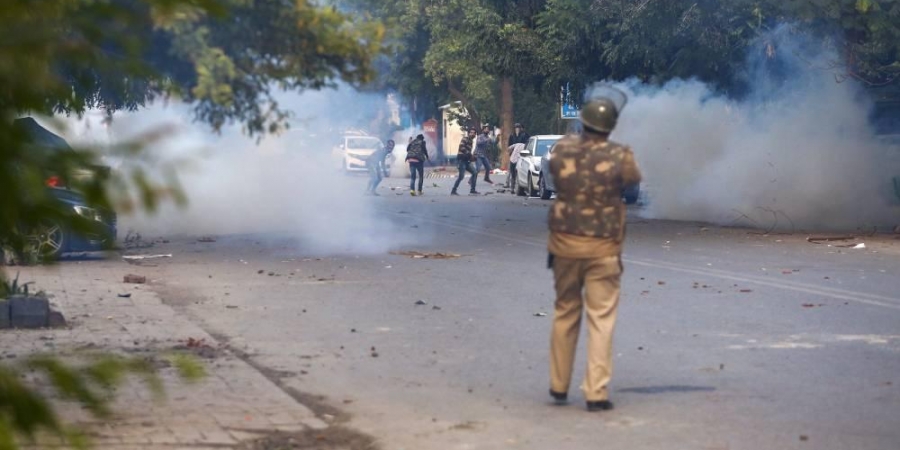
NEW DELHI: A court on Wednesday granted bail to activist Khalid Saifi here in a case related to the February riots in northeast Delhi, saying charge-sheeting him over “insignificant” material was total non-application of mind by the police which went to the extent of “vindictiveness”.
The court also failed to understand how a “lofty claim” of conspiracy could be inferred from a witness’s statement as it merely stated that Saifi, who is a member of United Against Hate, had allegedly met co-accused Tahir Hussain and Umar Khalid on January 8 in Shaheen Bagh, but did not disclose the subject matter of the meeting.
Additional Sessions Judge Vinod Yadav said Saifi cannot be permitted to remain behind bars in this case on the basis of “sketchy” material against him.
The court granted him bail on furnishing a bail bond of Rs 20,000 with one surety of like amount in the case related to rioting in Khajuri Khas area.
The court noted that if the principal accused, Tahir Hussain, was moved or actuated by Saifi in the meeting, then Saifi should have been made co-accused in ten other cases like Hussain, “which is not the case”.
It said the date of recording of the witness’s statement, which was September 27, itself spoke volumes about the credibility.
“The sole evidence of this so-called conspiracy is a statement of prosecution witness Rahul Kasana, wherein he stated on September 27, 2020, that he was standing outside a building in the area of Shaheen Bagh, where he had dropped principal accused Tahir Hussain, and thereafter he saw applicant and Umar Khalid going into the same building.”
“I fail to understand from the statement how a lofty claim of conspiracy can be inferred,” the judge said in his order.
“In my humble opinion, charge-sheeting the applicant in this case on the basis of such an insignificant material is total non-application of mind by the police which goes to the extent of vindictiveness,” the judge said in his order.
The court said it has nowhere been the case of the prosecution that Saifi was physically present at the scene of crime on the day of the incident and he has not been seen in any CCTV footage/viral videos of the matter.
“The applicant (Saifi) has merely been roped in the matter on the basis of his own disclosure statement and fourth disclosure statement of co-accused Tahir Hussain. Even no recovery of any sort has been effected from the applicant pursuant to his disclosure statement,” it said.
Saifi has also been arrested in the case related to larger conspiracy in the riots and has been booked under the Unlawful Activities (Prevention) Act.
The court noted that the contention that he had been in regular contact with Hussain and Khalid over mobile phone was hardly of any consequences, as prima facie it did not in any way go on to establish the criminal conspiracy alleged against him in the matter.
“In the said case the statement under Section 161 (examination by police) Code of Criminal Procedure of Rahul Kasana was recorded on May 21, 2020, on which date he did not utter a single word against the applicant (Saifi) qua ‘criminal conspiracy’,” the court said.
Now all of a sudden, he in his statement recorded “under Section 161 CrPC in the matter on September 27, blew the trumpet of ‘criminal conspiracy’ against the applicant,” it said, adding it prima facie does not appeal to the senses.
It added that the other piece of evidence which was sought to be used against Safi was a 71-second call made by Hussain to him in the intervening night of February 24/25, after the incident in the case had already taken place.
The court said Hussain has been accused in 10 other cases related to rioting but Saifi has been made accused in only two cases, even on the strength of the material that the prosecution showed against him.
“I do not find any rationale in the act of police in involving the applicant (Saifi) in this solitary case for the offence of conspiracy,” the judge said.
Senior advocate Rebecca John and advocate Harsh Bora, appearing for Saifi, claimed he had been falsely implicated in the case and his call detail records did not establish that he was in any criminal conspiracy with the other accused.
Special Public Prosecutor Manoj Chaudhary, appearing for the police, opposed the bail plea saying Saifi was allegedly part of a large-scale conspiracy hatched by Hussain with other anti-social elements.
United Against Hate was a citizens’ campaign launched in 2017 to protest against a series of lynching incidents in the country and was involved in the protests against the Citizenship Amendment Act.
Communal violence had broken out in northeast Delhi on February 24 after clashes between citizenship law supporters and protesters spiralled out of control leaving at least 53 people dead and around 200 injured.